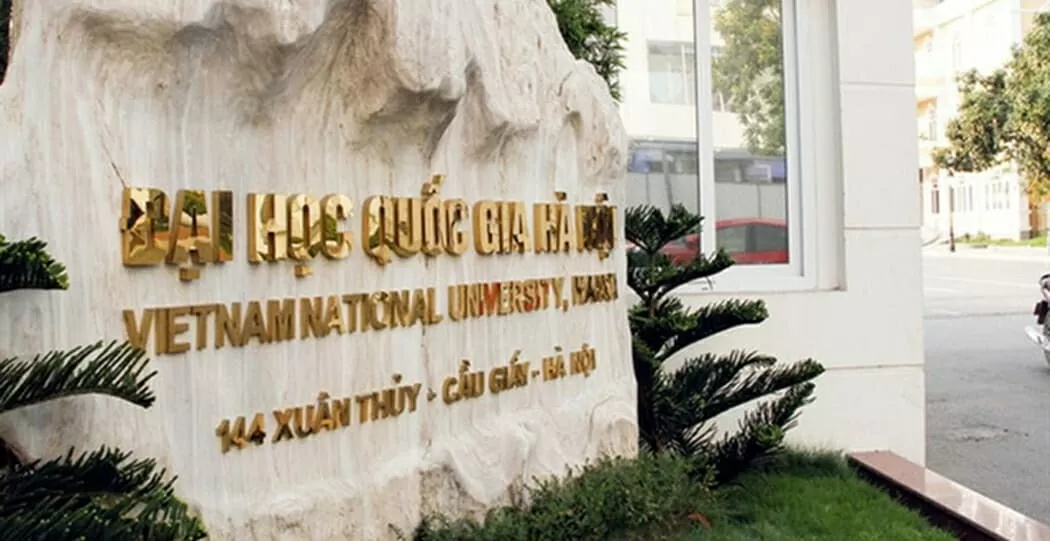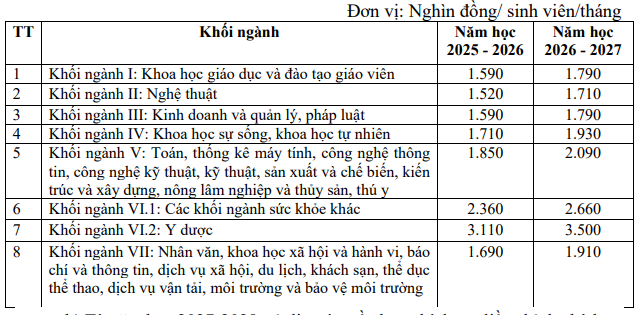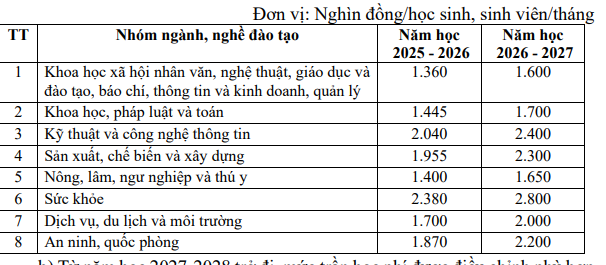 |
| The Ministry of Education and Training is seeking opinions on regulations regarding the ceiling for tuition fees at public higher education institutions. (Source: VGP) |
The Ministry of Education and Training is seeking public opinion on the draft Decree regulating the mechanism for collecting and managing tuition fees for educational institutions within the national education system, as well as policies on tuition fee exemption, reduction, and support; and service prices in the field of education and training.
Tuition fees for public higher education
The draft clearly states that the tuition fee ceiling for public higher education institutions that are not yet self-sufficient in covering their operating expenses, from the 2025-2026 academic year onwards, is as follows:
Academic years 2025-2026 and 2026-2027:
 |
From the 2027-2028 academic year onwards, the tuition fee ceiling will be adjusted to reflect people's affordability and socio-economic conditions, but it will not exceed the rate of increase in the consumer price index at the time of determining the tuition fee compared to the same period of the previous year, as announced by the competent state agency.
Public higher education institutions that are self-sufficient in covering their operating expenses: Tuition fees are set at a maximum of twice the tuition fee ceiling for institutions that are not self-sufficient in covering their operating expenses.
Public higher education institutions that are self-sufficient in covering both recurrent and investment expenditures: Tuition fees are set at a maximum of 2.5 times the tuition fee ceiling for institutions that are not self-sufficient in covering recurrent expenditures.
For training programs at public higher education institutions that meet the quality accreditation standards prescribed by the Ministry of Education and Training, or meet the quality accreditation standards of foreign or equivalent institutions, the higher education institution shall determine tuition fees based on the economic-technical norms or cost norms for each training field issued by the institution; and shall make this information transparent to students and the public.
Tuition fees for vocational education
According to the draft, the tuition fee ceiling for college-level and intermediate-level training programs at public vocational education institutions that are not self-sufficient in covering their operating expenses, from the 2025-2026 academic year onwards, is as follows:
Academic years 2025-2026 and 2026-2027:
 |
From the 2027-2028 academic year onwards, the tuition fee ceiling will be adjusted to reflect people's affordability and socio-economic conditions, but it will not exceed the rate of increase in the consumer price index at the time of determining the tuition fee compared to the same period of the previous year, as announced by the competent state agency.
For public vocational education institutions that are self-sufficient in covering their operating expenses: The maximum tuition fee shall not exceed twice the tuition fee of institutions that are not self-sufficient in covering their operating expenses.
For public vocational education institutions that are self-sufficient in covering both recurrent and investment expenditures: They have the autonomy to develop and determine tuition fees in accordance with the Law on Vocational Education and other relevant regulations.
For high-quality training programs and vocational education transfer programs from abroad, vocational education institutions shall base their decisions on the economic-technical norms or cost norms of each training field and profession issued by the institution to determine the specific tuition fees for each academic year, field, and profession under their management authority, and shall publicly disclose this information before enrollment.
At the same time, it is necessary to maintain standard training programs within the state-regulated tuition fee ceiling to fulfill the function of providing public services and ensure access to education for learners.
Tuition fees for continuing education programs
According to the draft, tuition fees for continuing education programs at the lower secondary and upper secondary levels in public educational institutions will be set at a rate equivalent to that of public general education institutions of the same level in the area, as stipulated by the Provincial/City People's Council.
Tuition fees serve as the basis for determining the level of tuition fee support for students in general education programs at private and non-private educational institutions, and the level of state budget support to compensate public educational institutions when implementing the policy of tuition fee exemption for students in general education programs.
Tuition fees for literacy programs: Public educational institutions establish tuition fees based on economic-technical or cost norms, submitting them to the People's Committee for consideration and approval by the Provincial/City People's Council, in accordance with the type of training and the actual conditions of each locality. Funding for literacy programs is implemented through orders, assignments, and bidding processes with educational institutions assigned the task of literacy programs, according to the state management hierarchy in education and training.
Source: https://baoquocte.vn/de-xuat-muc-hoc-phi-dai-hoc-cong-lap-320820.html




![[Photo] Prime Minister Pham Minh Chinh presides over a meeting to assess the situation during the Lunar New Year holiday.](https://vphoto.vietnam.vn/thumb/1200x675/vietnam/resource/IMAGE/2026/02/22/1771768925196_ndo_br_dsc-6283-jpg.webp)















































































































Comment (0)